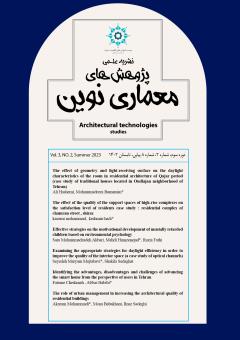Identifying the Advantages, Disadvantages and Challenges of Advancing the Smart Home from the Perspective of Users in Tehran
Subject Areas :
Fatemeh Cheshmeh
1
![]() ,
عباس حبیبی
2
*
,
عباس حبیبی
2
*
![]()
1 - Master of Interior Architecture, University of Science and Culture, Tehran, Iran.
2 - Instructor, Department of Architecture, University of Science and Culture, Tehran, Iran.
Keywords: Smart home, Internet of Things, Automation, Home environment.,
Abstract :
In today's world, technologies have reached such a level of progress and development that they cannot be ignored at the level of daily life. The smart house represents a new definition of the home space, which is associated with the entry of more and more technology into homes. The place of intelligentization in Iran, as an imported phenomenon, needs further study and investigations. The purpose of this research is to find the challenges facing smart building in Iranian homes and find out the users' attitude towards this issue. In the following, it has been tried to examine the advantages and disadvantages and the strengths and weaknesses of the smart home based on the lived experience of the users of Tehran. This research is based on the purpose of a fundamental research and in terms of method, it is a qualitative ethnographic study that was conducted by conducting in-depth and semi-structured interviews with two groups of actual and potential smart home users in Tehran. The findings of this research indicate that various components are effective in the level of users' satisfaction with the smartness of homes, which in the group of actual users include the components; psychological, social, economic, cultural, infrastructure and technology and in the group of potential users also includes the components; It is economic, social and cultural. The results show that despite the initial ideas, actual users often feel satisfied with living in these spaces and even if they are not completely satisfied, they do not deny the benefits of smartening. In fact, the most important challenge for the adoption of a smart home from the point of view of both groups is its high costs.
1- انصاری، منوچهر؛ محمدیان، ایوب؛ و نویسنده، احسان(1396). شناسایی کاربردهای اینترنت اشیا در خانه هوشمند با استفاده از روش فراترکیب. مدیریت فناوری اطلاعات، 9(4)، 659-678.
2- برازنده، جمیله؛ و فرزانه، نازبانو(1401). تشخیص فعالیت در خانههای هوشمند مبتنی بر الگوریتم حشره آبسوار و شبکه عصبی مصنوعی در شهر هوشمند. هوش مصنوعی و دادهکاوی، 10(1)، 1-13.
3- توسلیان، فاضله؛ نظری، امین؛ و محمدی، رضا(1399). یک پروتکل کارا در اینترنت اشیاء برای خانههای هوشمند. کنفرانس بینالمللی وب پژوهی.
4- حبیبی، عباس؛ یزدانفر، سید عباس؛ حمزه¬نژاد، مهدی؛ و کاظمی، عباس(1402). خانگی شدن رسانهها، رسانهای شدن خانهها؛ فرهنگ مادی فناوریهای رسانهای و تغییرات خانه و فضای خانگی در ایران. فصلنامه تحقیقات فرهنگی ایران، 16(1)، 5-47
5- حسینی¬نسب، سحر؛ معدنی، محسن؛ و زارع، مهدی(1397). طراحی درگاه بیسیم مبتنی بر زیگبی در شبکه اتوماسیون خانه هوشمند. دومین کنگره ملی توسعه پژوهش¬های نوین در مهندسی برق کامپیوتر.
6- حقی، پرویز؛ و امیریان، وحید(1392). استفاده از مهندسی ارزش در بهینهسازی انرژی ساختمانهای مسکونی. کنفرانس بینالمللی عمران، معماری و توسعه پایدار شهری. تبریز.
7- خدادادی، امین(1402). کاربرد فناوری تشخیص حرکت انسان در زمینه خانه هوشمند. هفتمین کنفرانس ملی پژوهشهای کاربردی در مهندسی برق، مکانیک و مکاترونیک. تهران.
8- ساعدی کپورچالی، محمدرضا؛ و مسعودی گوکانی، اعظم(1395). عوامل مؤثر بر کاهش مصرف انرژی در طراحی معماری خانه هوشمند. دومین کنفرانس بینالمللی نخبگان عمران، معماری و شهرسازی.
9- شیرازی، الهام؛ و جدید، شهرام(1394). برنامهریزی توامان تجهیزات الکتریکی و حرارتی خانه هوشمند. کنفرانس بینالمللی برق.
10- طیبی¬ابولحسنی، سید امیرحسین(1398). درآمدی بر روش تحقیق (رویههای استاندارد تحلیل دادههای کیفی). فصلنامه سیاستنامه علم و فناوری، 6(2)، 68-94
11- عبدالمالکی، الهام؛ جواهری، امین؛ حیدری¬شاهی، مجید؛ و رحمنی، سهیل(1402). نگاهی معمارانه به خانه هوشمند. دومین کنفرانس معماری، عمران، کشاورزی، معدن و محیطزیست.
12- فریدونیان، علیرضا؛ سعیدینیا، سپیده؛ و مؤمنی¬فراهانی، ارغوان(1396). طراحی و ساخت یک سیستم حلقه بسته کنترل دما در خانه هوشمند انرژی. کنفرانس ملی انجمن انرژی ایران (و کنفرانس بینالمللی فناوری و مدیریت انرژی ایران).
13- کارخانه، فرزانه؛ حبیبی، هادی؛ و حبیبی، راضیه(1395). سیستمهای کامپیوتری در خانههای هوشمند. پنجمین دوره کنفرانس بینالمللی پژوهش در علوم و تکنولوژی.
14- محمدپور، احمد(1400). روش در روش. قم: انتشارات لوگوس.
15- اسمارت¬شو. (1400). تاریخچه هوشمندسازی ساختمان] یادداشت وبلاگ[. بازیابی شده از https://smartsho.com
16- نصیری، بهاره(1401). شناسایی و تحلیل مؤلفههای اثرگذار بر سبک زندگی خانوادۀ دیجیتال در شهر تهران. فصلنامه علمی مطالعات فرهنگ-ارتباطات، 23(58)، 269-296. doi:10.22083/jccs.2021.277464.3314
17- هاشمیان، محمد حسین؛ و سروران مهرام، نازلی(1394). بررسی سیستمهای امنیتی خانههای هوشمند. اولین کنفرانس بینالمللی پژوهش در علوم و تکنولوژی.
18- Balta-Ozkan, N., Boteler, B., & Amerighi, O. (2014). European smart home market development: Public views on technical and economic aspects across the United Kingdom, Germany and Italy. Energy Research & Social Science, 3, 65-77. doi:10.1016/j.erss.2014.07.007
19- Li, M., Gu, W., Chen, W., He, Y., Wu, Y., & Zhang, Y. (2018). Smart home: architecture, technologies and systems. Procedia computer science, 131, 393-400. doi:10.1016/j.procs.2018.04.219
20- Shin, J., Park, Y., & Lee, D. (2018). Who will be smart home users? An analysis of adoption and diffusion of smart homes. Technological Forecasting and Social Change, 134, 246-253.doi:10.1016/j.techfore.2018.06.029
21- Sovacool, B. K., & Del Rio, D. D. F. (2020). Smart home technologies in Europe: A critical review of concepts, benefits, risks and policies. Renewable and sustainable energy reviews, 120, 109663. doi:10.1016/j.rser.2019.109663
22- Spigel, L. (2005). Designing the smart house: Posthuman domesticity and conspicuous production. European Journal of Cultural Studies, 8(4), 403-426. doi:10.1177/1367549405057826
23- Spigel, L. (2012). Domestic technologies and the modern home. In International encyclopedia of housing and home (pp. 383-398). Elsevier. doi:10.1016/B978-0-08-047163-1.00316-7

